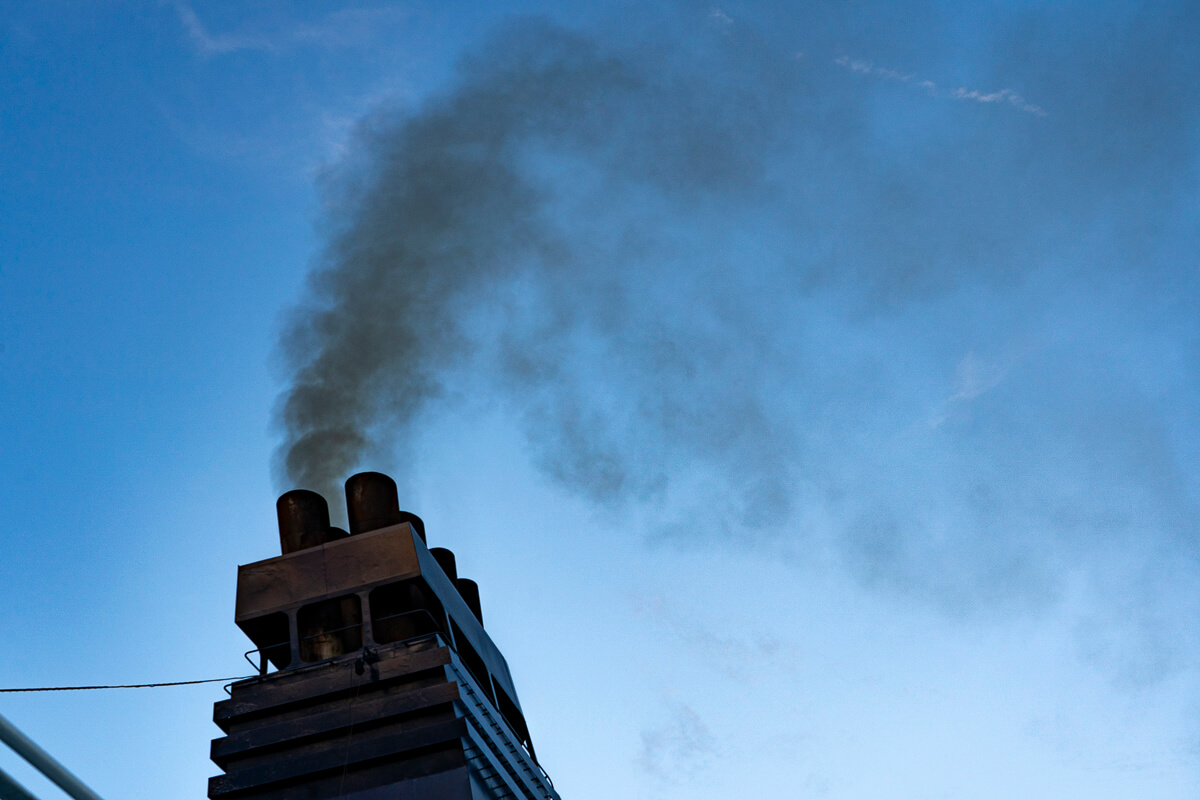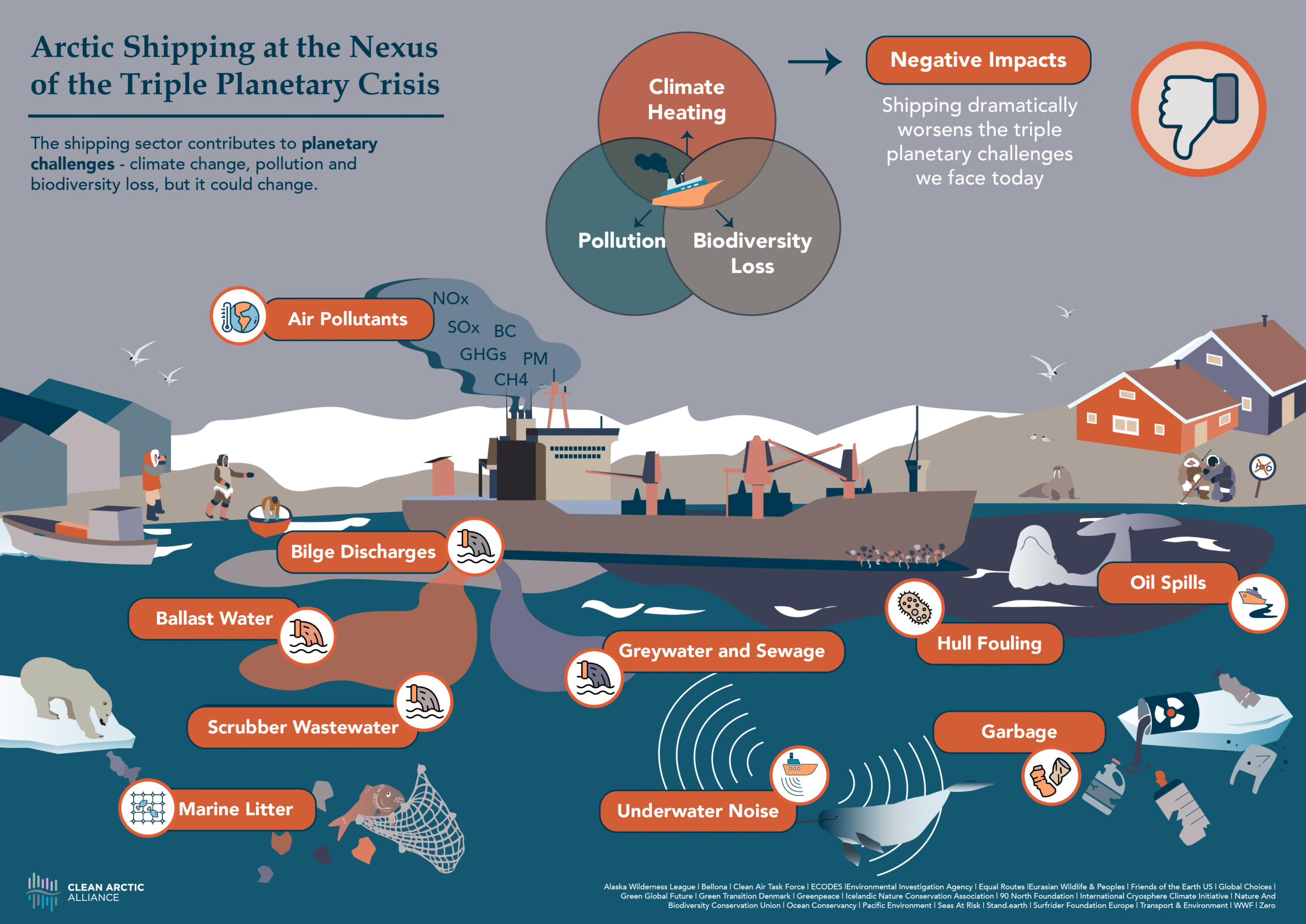![]()
In Celebration of the Life of Verner Wilson III
London, 7 July 2023:- As a meeting of the International Maritime Organization (IMO) – its Marine Environment Protection Committee (MEPC 80, July 3-7) – closed today in London, the Clean Arctic Alliance expressed dismay that the actions discussed and agreed this week will not be enough to save the Arctic from the climate impact of global shipping.
During MEPC 80, instead of committing to climate action, countries agreed on “indicative checkpoints” for reducing GHG emissions by at least 20%, “striving for 30%, by 2030”, and at least 70%, “striving for 80%, by 2040”, reaching net-zero “by or around, i.e., close to 2050”, qualified by whether “national circumstances allow”. [1] and See Clean Shipping Coalition press release for more details.
“In a week that saw the highest global temperatures ever recorded, IMO member states had a unique chance to show global leadership by curbing the shipping sector’s impact on the climate and the Arctic by slashing greenhouse gas emissions – but have instead opted for a bland, and weaker version of their earlier ambitions”, said Clean Arctic Alliance Lead Advisor Dr Sian Prior. “To make it worse, they also failed to include black carbon, which contributes around one-fifth of shipping’s climate impact in the revised GHG strategy. National governments and regions must now urgently put in place strong measures to enforce a lowering of shipping emissions if we are to stay within the 1.5C target of the Paris Agreement”.
Black Carbon
“After a wasted decade when the IMO should have taken swift action to slash black carbon emissions from shipping, this week it proved its credentials as a serial procrastinator by again failing to give any serious consideration or commitment to reducing black carbon emissions – the only clear decision it made was to kick the can down the road – again”, said Prior.
“The detailed discussion on black carbon regulation must take place at the PPR sub-committee, but we had hoped that Member States would make clear their commitment to urgently develop and adopt measures, and that they would agree this week that any measures to reduce black carbon emissions would have to apply to all ships operating across the whole Arctic and beyond. Instead the only papers and only comments came from the environmental groups”.
“The Arctic – a major regulator of the global climate – is considered by climate scientists to be now warming as much as four times faster than the planet as a whole, with the possibility of days with no summer sea ice – known as blue ocean events – as soon as the 2030s, which is extremely concerning”, said Prior. “In recent weeks the world has seen record temperatures, overheating seas and heat domes and forest fires – while the latest science shows that within fifteen years we are likely to exceed global climate tipping points. IMO member states are acting like we’ve all the time in the world – but that time is running out.”
“We have known for around three decades that reducing black carbon emissions is necessary, due to its climate and health impacts. On land, considerable effort has been made to ban dirtier fuels in power stations, and to install diesel particulate filters on land-based transport, but despite over a decade of prevarication the same efforts have not yet been made at sea. The IMO must get its house in order on black carbon by PPR11 in early 2024.”
“The shipping sector has the power to rapidly reduce its emissions of black carbon – what’s clearly missing now is the political will”, continued Prior. “Reducing black carbon emissions from shipping in and near the Arctic is straightforward, does not require development of new fuels or new technology, and can be achieved immediately. We must take advantage of ‘low hanging fruit’ that means slashing black carbon emissions from shipping that are contributing to Arctic warming” (see below for more on black carbon and the Arctic).
“Individual marine engines would see up to a 80% reduction in black carbon emissions depending on the engine by moving from heavy fuels to diesel fuels (the type and condition of the engine, and load of the ship are also factors). Moving all the ships operating in the Arctic and currently using heavy fuels will result in around a 44% reduction in black carbon emissions. Installing a diesel particulate filter – an existing technology used in land-based transport but which can only be used with cleaner fuels, would reduce black carbon emissions by over 90%.”
Some Good News
There is a small piece of good news, thanks to the announcements by Canada, Norway and a group of NE Atlantic littoral States (Austria, Estonia, Finland, France, Iceland, Ireland, Luxembourg, the Netherlands, Portugal, Poland, the United Kingdom and the European Commission) that they are developing proposals for three new emission control areas (ECA). Canada had submitted a paper of intent on their desire to designate their Arctic waters as an ECA which they intend to bring to MEPC in 2024, while the NE Atlantic littoral States and European Commission announced that they are undertaking the studies needed to support a proposal for a new ECA. Norway also confirmed during the meeting that they will be submitting a proposal to MEPC next year.
Scrubbers
The Clean Arctic Alliance is disappointed that there has been no progress this week on exhaust gas cleaning systems, however there is a sense that momentum is building and more detailed discussion will take place at PPR 11 in February 2023. The proposal from the European Commission and EU Member States proposes amendments to MARPOL to allow the regulation of discharge waters. Hopefully the writing is on the wall – scrubbers are not a suitable compliance mechanism to meet the SOx emission requirements.
Underwater noise
Adoption of the revised IMO’s Underwater Noise Guidelines – is an important development, however there remains work to be done. It is critical now, that Member States put equal effort into ensuring effective uptake of the guidelines and the consideration of mandatory measures.
About Black Carbon and the Arctic
Black carbon is a short-lived climate pollutant, produced by the incomplete burning of fossil fuels, with an impact more than three thousand times that of CO2 over a 20 year period. It makes up around one-fifth of international shipping’s climate impact.
Not only does it contribute to warming while in the atmosphere, black carbon accelerates melting if deposited onto snow and ice – hence it has a disproportionate impact when released in and near to the Arctic. The melting snow and ice exposes darker areas of land and water and these dark patches then absorb further heat from the sun and the reflective capacity of the planet’s polar ice caps is severely reduced. More heat in the polar systems – results in increased melting. This is the loss of the albedo effect.
Declines in sea ice extent and volume are leading to a burgeoning social and environmental crisis in the Arctic, while cascading changes are impacting global climate and ocean circulation. Scientists have high confidence that processes are nearing points beyond which rapid and irreversible changes on the scale of multiple human generations are possible. Scientists say it is now too late to save summer Arctic sea ice, and research has shown that “preparations need to be made for the increased extreme weather across the northern hemisphere that is likely to occur as a result.”
Black carbon also has a negative impact on human health, and recent research has found black carbon particles in the body tissues of foetuses, following inhalation by pregnant mothers.
The need to reduce emissions of black carbon because of both the climate and health impacts has been long recognised. On land, considerable effort has been made to ban dirtier fuels in power stations, to install diesel particulate filters on land-based transport, and to improve the burning of dry wood – all to reduce emissions of black carbon and improve air quality. However, at sea the same efforts have not yet been made.
Earlier press release: IMO Must Pick Low Hanging Fruit By Cutting Black Carbon Emissions
Contact:
Dave Walsh, Communications Advisor, [email protected], +34 691 826 764
Notes:
[1] MEPC 80/WP.12, 6 July 2023, Report of the Working Group on Reduction of GHG Emissions from Ships
About the Clean Arctic Alliance
Made up of 21 not-for-profit organisations, the Clean Arctic Alliance campaigns to persuade governments to take action to protect the Arctic, its wildlife and its people.
Members include: The Altai Project, Alaska Wilderness League, Bellona, Clean Air Task Force, Green Transition Denmark, Ecology and Development Foundation ECODES, Environmental Investigation Agency, Friends of the Earth US, Global Choices, Greenpeace, Iceland Nature Conservation Association, International Cryosphere Climate Initiative, Nature And Biodiversity Conservation Union, Ocean Conservancy, Pacific Environment, Seas At Risk, Surfrider Foundation Europe, Stand.Earth, Transport & Environment, WWF and Zero.
More more information visit https://www.cleanarctic.org/



